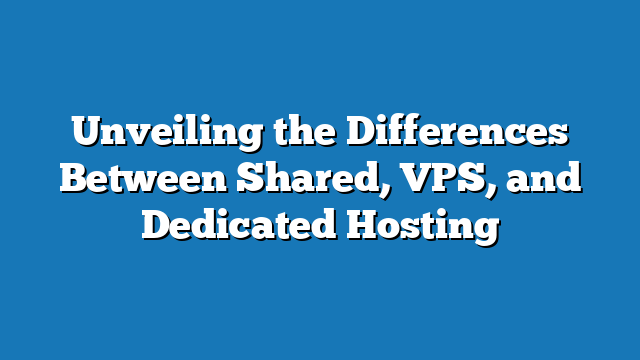Web Hosting enables your website to, a digital realm where you showcase your brand, engage with your audience, and conduct business. But just like a castle needs a solid foundation, your website needs a reliable web hosting solution to thrive online. With a vast array of web hosting options, choosing the right one can feel overwhelming. This blog delves into the three main types of web hosting – shared, VPS (Virtual Private Server), and dedicated – to help you select the perfect fit for your online castle.
Table of Contents
Understanding the Web Hosting Landscape

Web hosting refers to the service of storing your website’s files and making them accessible on the internet. Think of it as renting space on a powerful computer (server) that’s constantly connected to the internet. Here’s a breakdown of the three most common types of web hosting:
- Shared Hosting: Imagine a bustling apartment complex. Shared hosting is like renting an apartment within that complex. Multiple websites share the resources of a single server, including processing power (CPU), memory (RAM), and storage space. It’s a cost-effective option for beginners with basic website needs.
- Best VPS Hosting: Think of a multi-unit building with private offices. VPS hosting virtualizes a physical server into multiple virtual servers, each acting like a dedicated server. Each virtual server has its own allocated resources, offering greater control, security, and performance compared to shared hosting. Also, having SSD VPS Hosting is a great choice.
- Dedicated Hosting: Imagine having your private castle. Dedicated hosting provides an entire physical server for your website alone. You have complete control over the server environment, resources, and security configuration. This option is ideal for high-traffic websites or businesses with specific security requirements.
A Comparative Analysis: Unveiling the Pros and Cons
Now that we understand the basic concepts, let’s explore the advantages and disadvantages of each type of web hosting to help you make an informed decision:
Shared Hosting:
- Pros: Highly affordable, user-friendly interface, suitable for basic websites with low traffic.
- Cons: Limited resources, performance fluctuations depending on other websites on the server, minimal control over the server environment.
VPS Hosting:
- Pros: Offers a good balance between affordability and control, improved performance and security compared to shared hosting, and scalable resources to accommodate website growth.
- Cons: Requires some technical knowledge for server management, more expensive than shared hosting.
Dedicated Hosting:
- Pros: Ultimate control and customization, ideal for high-traffic websites or businesses with strict security needs, dedicated resources guarantee optimal performance.
- Cons: The most expensive option, requires significant technical expertise for server management.
Choosing the Right Web Hosting for Your Needs
The ideal web hosting solution depends on your website’s specific needs and your comfort level with technical aspects. Here’s a quick guide to help you navigate:
- For Beginners with Basic Websites: Shared hosting offers a cost-effective starting point, especially if you’re just starting your online journey.
- For Growing Websites with Increasing Traffic: VPS hosting provides the perfect balance of affordability, scalability, and control as your website expands and traffic increases.
- For High-Traffic Websites or Businesses with Security Concerns: Dedicated hosting offers the ultimate control and security for mission-critical websites or businesses handling sensitive data.
Beyond the Basics: Additional Factors to Consider
While cost, resources, and control are primary factors, consider these additional aspects when choosing your web hosting provider:
- Uptime Guarantee: Ensures your website remains accessible to visitors, aim for a provider with a high uptime guarantee (ideally 99.9% or higher).
- Security Features: Look for a provider offering robust security measures like firewalls, intrusion detection systems, and regular backups to safeguard your website data.
- Customer Support: Reliable technical support is crucial, especially if you’re not tech-savvy. Choose a provider with responsive and knowledgeable customer service representatives.
- Scalability: Consider your website’s future growth. Opt for a provider that allows easy scaling of resources like CPU, RAM, and storage as your website expands.
Building a Thriving Online Presence: A Final Note
Choosing the right web hosting solution is a crucial step in building a strong online presence. By understanding the differences between shared, VPS, and dedicated hosting, you can select the option that best suits your website’s needs and budget. Remember, your web hosting service is the foundation of your online castle. Choose wisely for a secure and scalable platform that empowers your website to flourish in the digital realm. You can also opt for Free PHP Web Hosting.
FAQs: Navigating the Web Hosting Landscape
Q: Can I switch web hosting providers if I’m not happy with my current plan?
A: Absolutely! Many web hosting providers offer migration services to help you seamlessly transfer your website to their platform. Ensure your new provider offers this service and inquire about any associated costs.
Q: What happens if my website outgrows shared hosting? Are there warning signs?
A: Signs that your website might be straining shared hosting resources include slow loading times, frequent downtime, or difficulty managing email accounts. If you experience these issues, consider upgrading to a VPS plan to accommodate your website’s growth.
Q: Is dedicated hosting too complex for someone with limited technical knowledge?
A: Dedicated hosting offers the most control, but it also requires the most technical expertise. If you’re not comfortable managing a server environment yourself, consider managed VPS hosting plans. These plans offer the benefits of VPS hosting with the provider handling the server management aspects for you.
Q: Are there any security risks associated with shared hosting?
A: Shared hosting environments do carry a slightly higher security risk compared to VPS or dedicated hosting. This is because a vulnerability on one website on the server could potentially impact others. Choose a web hosting provider with robust security measures to mitigate these risks.
Q: How often should I back up my website?
A: It’s crucial to back up your website data regularly, regardless of your chosen web hosting plan. Ideally, automate your backups to ensure they occur consistently. The frequency of backups depends on how often your website content changes. Daily backups are recommended for websites with frequently updated content.
Bonus Content: Optimizing Your Web Hosting Choice for Different Website Types
E-commerce Websites:
For e-commerce websites, consistent performance and security are paramount. Transaction processing needs to be smooth and secure to maintain customer trust. VPS hosting offers a good balance between affordability and the resources needed to handle online transactions efficiently. As your e-commerce business scales, consider dedicated hosting for optimal performance and security.
Blogs and Personal Websites:
For personal websites or blogs with moderate traffic, shared hosting might be sufficient initially. However, if you anticipate significant growth in traffic or plan to incorporate features like video content, consider upgrading to a VPS plan. VPS hosting provides the flexibility to accommodate these needs without sacrificing performance.
Business Websites:
For professional business websites, reliability and a professional image are crucial. VPS hosting offers the perfect blend of control, security, and scalability for business websites. You can customize the server environment to suit your specific business needs and ensure your website remains accessible and professional-looking for potential clients.
Forums and Community Platforms:
Websites that facilitate online communities, such as forums or social media platforms, experience fluctuating traffic patterns. VPS hosting provides the scalability to handle sudden surges in activity without compromising performance. Additionally, the security features of VPS hosting are essential for safeguarding user data within these communities.
Remember: The ideal web hosting solution depends on your website’s unique needs and future growth plans. By carefully evaluating your requirements and considering the factors mentioned above, you can make an informed decision that empowers your online castle to thrive in the digital world.
